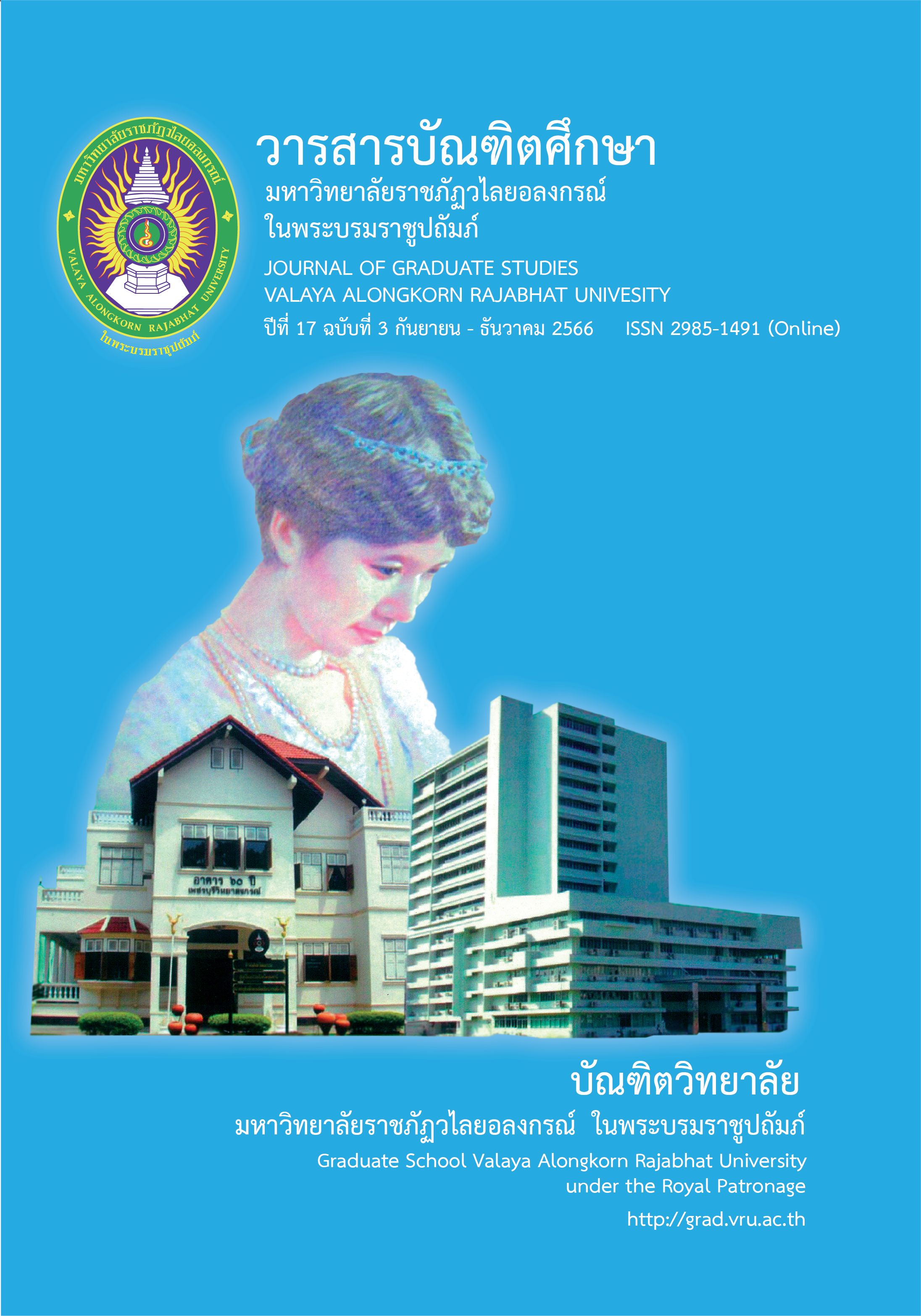EFFECT OF INQUIRY BASED LEARNING INTEGRATED ARGUMENTATION ACTIVITIES TO ENHANCE SCIENTIFIC EXPLANATION AND SCIENCE PROCESS SKILLS
Main Article Content
Abstract
The purposes of this research were to 1) compare the ability to scientific explanations between before and after learning by inquiry-based learning integrated argumentation activities, and 2) compare science process skills between before and after learning by inquiry-based learning integrated argumentation activities. The target group was 26 seventh-grade students in the second semester of the 2021 academic year, selected using purposive sampling. The research design was a one-group pretest-posttest. The instruments were included: 1) the learning activities in unit 5: thermal energy using inquiry-based learning integrated argumentation for 15 hours, 2) a scientific explanation ability test with five open-ended questions covering the concept of thermal energy. Each item was divided into 3 parts according to scientific explanation elements namely claim, evidence, and reasoning. The elements were divided into three levels of the answer: good, fair, and improving, and 3) a science process skills test with 30 multiple-choice items. The collected data were analyzed by using means, standard deviation, t-test, and the total students’ scientific explanation ability was weighted by mean score and grouped the data into 3 class intervals (Full score=2).
The research findings were as follow: 1) Students who learned by inquiry-based learning integrated argumentation activities had the posttest means score of scientific explanation abilities higher than the pretest significantly at the .05 level and students had scientific explanation ability in good level (1.75 scores). And 2) students who learned by inquiry-based learning integrated argumentation activities had the posttest means score of science process skills higher than the pretest significantly at the .05 level.
Article Details

This work is licensed under a Creative Commons Attribution-NonCommercial-NoDerivatives 4.0 International License.
บทความทุกเรื่องได้รับการตรวจความถูกต้องทางวิชาการโดยผู้ทรงคุณวุฒิ ทรรศนะและข้อคิดเห็นในบทความ Journal of Global of Perspectives in Humanities and Social Sciences (J-GPHSS) มิใช่เป็นทรรศนะและความคิดของผู้จัดทำจึงมิใช่ความรับผิดชอบของบัณฑิตวิทยาลัย มหาวิทยาลัยราชภัฏวไลยอลงกรณ์ ในพระบรมราชูปถัมภ์ กองบรรณาธิการไม่สงวนสิทธิ์การคัดลอก แต่ให้อ้างอิงแหล่งที่มา
References
Chamrat, S. (2017). Kānčhatkānrīankānsō̜n witthayāsāt 1. Nai Pra mūan sārachut wichasārattha Witthaya withīlæ tham ma chat khō̜ng witthayāsāt [Teaching and learning science 1. Foundations, methodologies, and nature of science education]. 5th ed. Nonthaburi: Sukhothai Thammathirat Open University.
Chaowakeratipong, N. (2019). Kānsongsœ̄m khwām sāmāt naikān sāngkhāʻ athibāichœ̄ng witthayāsāt khō̜ng phūrīan dūai kānsō̜nbǣpsư̄pso̜hākhwāmrū [Enhancing the ability in constructing scientific explanations of learners by using the inquiry teaching method]. STOU Journal. 12(1), 40–54.
Chutrakoolwong, A. (2014). phon khō̜ng kān rīan kānsō̜n bǣp sư̄p sō̜p dōi chai kham thām tām kān čhamnǣk praphēt watthuprasong thāngkān sưksā khō̜ngblūm thī mī tō̜ phon samrit thāngkān rīan fisik læ thaksa krabūankān thāng witthayāsāt khan phasomphasān khō̜ng nakrīan matthayommasưksā tō̜n plāi [Effects of inquiry instruction using questions based on bloom’s Taxonomy of educational objectives on physics learning achievement and integrated science process skills of upper secondary school students]. An Online Journal of Education. 9(1), 383-397. Retrieved from https://www.edu.chula.ac.th/ojed
Jamjai, O. (2014). Kān phat thanā khwām sāmāt naikān sāngkhamʻathibāichœ̄ng witthayāsāt khō̜ng nakrīan radap chanmatthayomsưksā pīthī Sām Dūairūp bǣp kānrīankānsō̜n bǣpsư̄pso̜ rūam kapkon withīkāntōyǣng [The development of grade 9 students’ ability in making scientific explanation using argumentation and inquiry approach]. Master of Education (Science Education). Kasetsart University.
Junping, J. (2012, September). kānphatthanā thaksa krabūankān thāng witthayāsāt khan būranākān khō̜ng nakrīan chan matthayommasưksā pī thī sō̜ng dōi kānčhatkān rīanrū bǣp sư̄pso̜ hākhwām rū [The development of an integrated science process skills of grade 8th students using the inquiry method]. In kān prachum sanœ̄ phonngā nawičhai radap bandit sưksā Mahāwitthayālai Sukhōthaithammāthirāt khrang thī sō̜ng [The 2nd STOU Graduate Research Conference]. (pp. 1-9). Nonthaburi: Sukhothai Thammathirat Open University.
Mcneill, K. L. & Krajcik, J. S. (2008). Scientific explanations: Characterizing and evaluating the effects of teachers' instructional practices on student learning. Journal of Research in Science Teaching. 45(1), 53–78.
Ministry of Education. (2017). Tūachīwatlæ sārakānrīanru ̄kǣnklāngklum sārakānrīanrūwitthayāsāt tām lak sūt kǣn klāng kānsưksānaphư̄nthān Phutthasakrāt (chabapkǣkhai) Sō̜ngphanhārō̜ihoksip [Indicators and learning areas in science, basic education, core curriculum (Revised) B.E. 2017]. Bangkok: Kurusapa Printing.
Osborne, J., Erduran, S., & Simon, S. (2004). Enhancing the quality argumentation in school science. Journal of Research in Science Teaching. 41(10), 994–1020.
Sampson, V. & Clark, D. V. (2009). The impact of collaboration on the outcomes of scientific argumentation. Journal of Science Education. 93, 448–484.
Sirithon, N. (2019). Kān čhat kānrīan rūbǣpsư̄pso̜thī khap khlư̄an dūaikon withīkāntōyǣng phư̄a phat thana ̄khwāmsāmāt naikānsāngkhamʻ athibāichœ̄ng witthayāsāt khō̜ngnakrīan chanmatthayomsưksāpī thī Sī Rư̄ang Rǣng Mūan lækotkānkhlư̄anthī [Implementing argument-driven inquiry approach for developing grade 10 students’ ability to make scientific explanation on the topic of force, mass, and law of motion]. Silpakorn University Journal. 39(1), 130–141.
The Institute for the Promotion of Teaching Science and Technology. (2017). Krō̜p khrōng sāng kān pra mœ̄n phon nakrīan khrōng kān PISA Sō̜ngphansiphā [PISA 2015 student assessment framework]. Retrieved from https://pisathailand.ipst.ac.th/pisa2018-fullreport/
The Institute for the Promotion of Teaching Science and Technology. (2021). Phon kān pramœ̄n PISA Sō̜ng phansip pǣt Kānʻān Khanitsāt læwitthayāsāt [PISA 2018 assessment framework: Key competencies in reading, mathematics and science]. Retrieved from https://pisathailand.ipst.ac.th/pisa-2015-framework/


